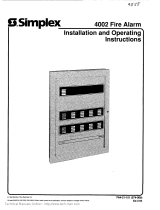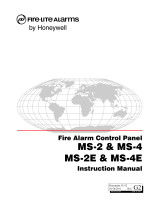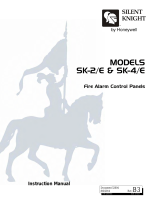System Sensor WFD20A is a vane-type waterflow detector designed for use in wet-pipe fire sprinkler systems to signal the presence of water flow. It features a pneumatic delay mechanism that prevents false alarms from water surges or accidental bumps. The WFD20A has two SPDT switches that can be wired for a variety of applications, including connection to a listed sprinkler/fire alarm control panel or a local bell. It is compatible with steel water pipes of schedule 10 through 40 and has a maximum pressure rating of 450 psig.
System Sensor WFD20A is a vane-type waterflow detector designed for use in wet-pipe fire sprinkler systems to signal the presence of water flow. It features a pneumatic delay mechanism that prevents false alarms from water surges or accidental bumps. The WFD20A has two SPDT switches that can be wired for a variety of applications, including connection to a listed sprinkler/fire alarm control panel or a local bell. It is compatible with steel water pipes of schedule 10 through 40 and has a maximum pressure rating of 450 psig.




-
 1
1
-
 2
2
-
 3
3
-
 4
4
System Sensor WFD20A is a vane-type waterflow detector designed for use in wet-pipe fire sprinkler systems to signal the presence of water flow. It features a pneumatic delay mechanism that prevents false alarms from water surges or accidental bumps. The WFD20A has two SPDT switches that can be wired for a variety of applications, including connection to a listed sprinkler/fire alarm control panel or a local bell. It is compatible with steel water pipes of schedule 10 through 40 and has a maximum pressure rating of 450 psig.
Ask a question and I''ll find the answer in the document
Finding information in a document is now easier with AI
Related papers
-
System Sensor WFDNA Series Installation And Maintenance Instruction
-
System Sensor WFD Models User manual
-
System Sensor WFD Explosion Proof User manual
-
System Sensor WFD European Models User manual
-
System Sensor AFDT and AFDTH User manual
-
System Sensor LFD Models User manual
-
System Sensor AFD Models User manual
-
System Sensor WFDN Series Waterflow Detectors User manual
-
System Sensor WFDT and WFDTH User manual
-
System Sensor WFDEN Series Waterflow Detectors User manual
Other documents
-
Ti-SALES FRS202 Installation guide
-
Potter VSR-FE-2 Vane Type Waterflow Switch Owner's manual
-
Potter VSR-CR-10 Corrosion Resistant Vane Type Waterflow Alarm Switch Owner's manual
-
Potter VS-SP Vane Type Waterflow Alarm Switch Small Pipe Owner's manual
-
 Simplex 4002 Installation And Operating Instructions Manual
Simplex 4002 Installation And Operating Instructions Manual
-
Potter VSG Low Flow Rate Vane Type Waterflow Switch Owner's manual
-
 Fire-Lite MS-2E User manual
Fire-Lite MS-2E User manual
-
Honeywell MS-2 User manual
-
 SILENT KNIGHT SK-2 and SK-4 Conventional FACP 2 & 4 Zone User manual
SILENT KNIGHT SK-2 and SK-4 Conventional FACP 2 & 4 Zone User manual
-
Fire-Lite Alarms MRP-2001E User manual






